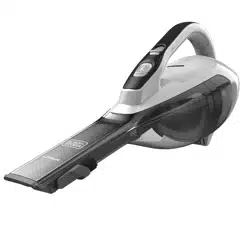Loading ...
Loading ...
Loading ...

ENGLISH
3
ASSEMBLY
WARNING: Do not attempt to modify or
repair the appliance
Wall Mounting
The product can be wall mounted, if desired, using the wall
mount bracket, screws and anchors supplied. To wall mount
the vac, refer to Figures B, C, D and E.
• Figure B - Mark the location of the screw holes (within
reach of an electrical outlet for charging the vac while it
is on the wall bracket).
• Figure C - Insert the charger cord into the curved slot
in the wall mount bracket
9
leaving approximately 8–9
inches (203 mm - 227 mm) excess as shown.
The RBRC® Seal
Please take your spent battery packs to
an authorized BLACK+DECKER service
center or to your local retailer for recycling.
In some areas, it is illegal to place spent
battery packs in the trash. You may also contact your local
recycling center for information on where to drop off the
spent battery pack. Do not place in curbside recycling. For
more information visit www.call2recycle.org or call the
toll-free number in the RBRC®Seal.
RBRC® is a registered trademark of Call 2Recycle,Inc.
Additional Safety Information
WARNING: Never modify the appliance or
any part of it. Damage or personal injury couldresult.
Additional Safety Warnings
a ) Prevent unintentional starting. Ensure the switch
is in the off‑position before picking up or carrying
the appliance. Carrying the appliance with your finger
on the switch or energizing an appliance that has the
switch on, invitesaccidents.
b ) Recharge only with the charger specified by the
manufacturer. A charger that is suitable for one type
of battery pack may create a risk of fire when used with
another batterypack.
c ) Use appliance only with specifically designed
battery packs. Use of any other battery packs may
create a risk of injury andfire.
d ) When battery pack is not in use, keep it away
from other metal objects, like paper clips, coins,
keys, nails, screws or other small metal objects,
that can make a connection from one terminal to
another. Shorting the battery terminals together may
cause burns or afire.
e ) Under abusive conditions, liquid may be ejected
from the battery; avoid contact. If contact
accidentally occurs, flush with water. If liquid
contacts eyes, additionally seek medical help.
Liquid ejected from the battery may cause irritation
orburns.
f ) Do not use a battery pack or appliance that
is damaged or modified. Damaged or modified
batteries may exhibit unpredictable behavior resulting
in fire, explosion or risk ofinjury.
g ) Do not expose a battery pack or appliance
to fire or excessive temperature. Exposure to
fire or temperature above 266°F (130°C) may
causeexplosion.
h ) Follow all charging instructions and do not
charge the battery pack or appliance outside
of the temperature range specified in the
instructions. Charging improperly or at temperatures
outside of the specified range may damage the battery
and increase the risk of fire.
i ) Have servicing performed by a qualified repair
person using only identical replacement parts.
This will ensure that the safety of the product
ismaintained.
j ) Do not modify or attempt to repair the appliance
or the battery pack except as indicated in the
instructions for use andcare.
k ) Only for use with S003AQU1500015charger.
The label on your tool may include the following symbols. The
symbols and their definitions are asfollows:
V ......................... volts
Hz .......................hertz
min ..................... minutes
or DC ......direct current
...................... Class I Construction
(grounded)
…/min ..............per minute
BPM .................... beats per minute
IPM ..................... impacts per minute
OPM ....................
oscillations per minute
RPM ....................
revolutions per minute
sfpm ...................
surface feet per
minute
SPM .................... strokes per minute
A ......................... amperes
W ........................watts
Wh ......................watt hours
Ah ....................... amp hours
or AC ........... alternating current
or AC/DC .... alternating or direct
current
...................... Class II Construction
(double insulated)
n
o
.......................no load speed
n .........................rated speed
PSI.......................
pounds per square inch
......................earthing terminal
.....................safety alert symbol
..................... visible radiation–
do not stare into
the light
..................... wear respiratory
protection
..................... wear eye protection
..................... wear hearing
protection
..................... r
ead all documentation
.....................
do not expose to rain
• Wear protective clothing and wash exposed areas
with soap and water. Allowing dust to get into your
mouth, eyes, or lay on the skin may promote absorption of
harmfulchemicals. Direct particles away from face andbody.
• Air vents often cover moving parts and should be
avoided. Loose clothes, jewelry or long hair can be caught
in movingparts.
• Leaks from battery cells can occur under extreme
conditions. If the liquid, which is a 20-35% solution of
potassium hydroxide, gets on the skin (1) wash quickly with
soap and water or (2) neutralize with a mild acid such as
lemon juice or vinegar. If the liquid gets into the eyes, flush
them immediately with clean water for a minimum of
10minutes. Seek medicalattention.
SAVE THESE INSTRUCTIONS
Loading ...
Loading ...
Loading ...
